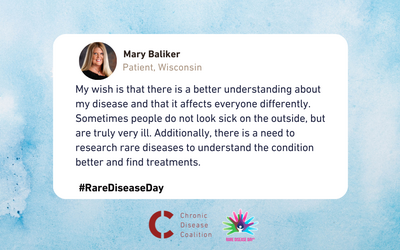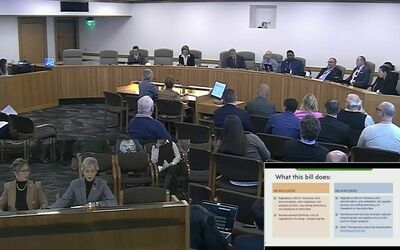
Twice a month, we share quick advocacy tips and insights that you can use right away to become a better chronic advocate. This week, learn how to be a better storyteller, support kidney patients and take action for rare disease patients and more in our bi-weekly advocacy update!
1. Learn how to be an effective storyteller

At the CDC we know that Americans need policy reform at the state and federal level to make the lives of chronic disease patients better. The best way to create this change is sharing the real, raw stories of chronic patients. To help you share your story, we have outlined best practices and a template to make sharing your story with legislators as easy as possible.
2. Urge Congress to restore kidney patient protections

The Supreme Court recently allowed employer-based group health plans to exclude essential kidney care services from their coverage, potentially pushing ESRD patients off their private insurance plans. This decision undermines the protections established by the Medicare Secondary Payor Act (MSPA) and could lead to financial strain on patients, loss of access to quality care, and increased out-of-pocket expenses. In response, lawmakers have introduced the Restore Protections for Dialysis Patients Act (H.R. 6860) to address these issues and protect ESRD patients.
3. Support rare disease patients

One out of every 10 Americans is living with a rare disease. Worldwide, there are more than 300 million people with rare diseases. Too often, these individuals and families are left isolated and without answers to their medical questions. It doesn't have to be that way. Rare Disease Day is a global initiative to raise awareness and generate support for everyone who is on a rare medical journey. It takes place on the last day of February, which this year is February 29th, the rarest day of the year. Continue to stand up for rare disease patients: Support the ORPHAN Cures Act.
4. Support PBM Transparency in Oregon

Over the past several years, several small and local pharmacies across Oregon — but especially in rural parts of the state — have closed their doors due to low reimbursements from pharmacy benefit managers. This restricts access for some of Oregon's most vulnerable residents, especially those with chronic conditions. Fortunately, there is a bipartisan bill that would address this issue by requiring PBMs to get a state license in Oregon, disclose their fees, prohibit them from using additional fees or canceling contracts to retaliate against pharmacies for raising concerns, and limit how PBMs can audit pharmacies. This is a big step forward in maintaining access to treatment for Oregonians.
5. Find your community of advocates

As a chronic disease patient, sometimes it can feel like you don’t have a voice in the American health care system. We are here to change that! As a Chronic Disease Coalition Ambassador, you will be actively involved in creating local, state and national change to protect chronic disease patient rights — and have fun alongside likeminded patient advocates. Join the ambassador program!